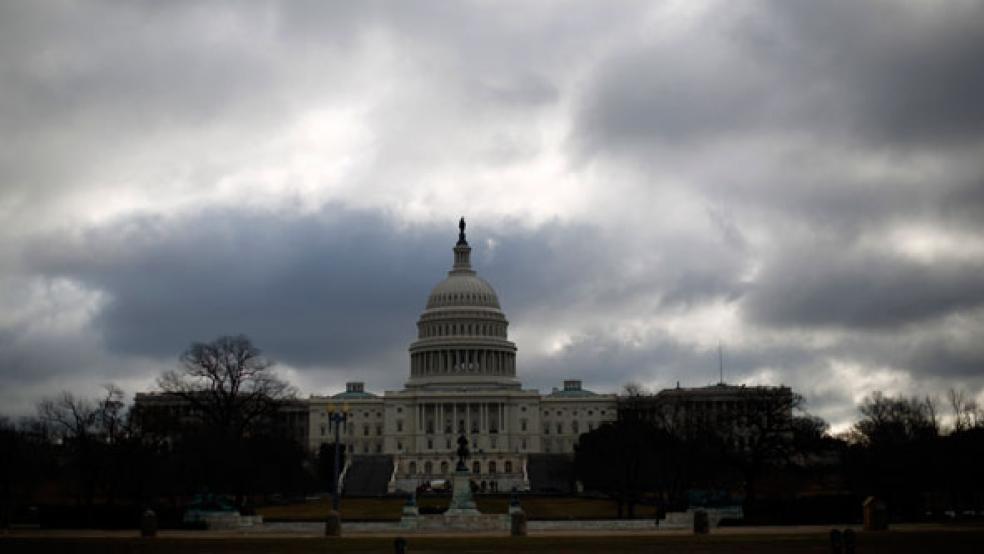Here’s a shocking thought: maybe Congress isn’t so dysfunctional after all. Maybe it is actually executing the will of the people – people fed up with pay-offs and handouts, pork and piggishness -- Congress’ “business as usual” cronyism. Obamacare put them over the edge.

Americans have resolutely opposed the Patient Protection and Affordable Care Act – aka Obamacare – since its inception, but Congress passed it anyway. Not only was the public rightly wary of the government’s upending of one sixth of our economy – a dangerous act of hubris in the midst of a terrible recession – they were also appalled at how the monstrous bill passed.
They were disgusted by the $100 million Cornhusker Kickback that won Senator Ben Nelson’s vote, the $300 million Louisiana Purchase that swayed Mary Landrieu, the malfeasance of legislators who blindly voted for the unread 1,000-page bill. They knew Obamacare was a stinker from the get-go, and they punished those who rammed it down their throats in 2010, electing a GOP House by a vast margin.
It is not surprising that the House, so elected, might hold fast the lessons of 2010. Among other things, they are allergic to big, fat indigestible bills. When 179 Republicans voted against the $70 billion Sandy Relief bill, the usual suspects were outraged, blasting Tea Party intransigence. But Senator Kelly Ayotte argued persuasively in an op-ed why she voted “no,” describing the bill’s hidden pork – the millions and billions snuck in to fix a leaky roof at the Smithsonian, for new cars for the FBI, and for highway repairs across the country. She had earlier supported a $24 billion package that actually targeted Sandy victims, but that bill was defeated. As she pointed out, the Sandy package ultimately ended up costing more than the annual Homeland Security budget. Imagine that.
THE FARM BILL IS A PORKER
The liberal media is appalled that the farm bill failed – but there is no good reason that food stamps and dairy supports should go hand-in-hand in a 1,000 page, $940 billion bill – except to hide something. Despite all the hollering about cuts to food stamps, the CBO concluded that the farm legislation torpedoed in the House was 56 percent more expensive than its 2008 predecessor. Since the CBO underestimated the costs of the 2008 bill by $309 billion, skeptics naturally assume they might be overly optimistic about this one as well, and that the price jump is even greater.
In a study for the Mercatus Center, Vincent Smith shows the farm bill to be a classic “bait and switch.” While congratulating themselves on doing away with direct farm subsidies, our legislators have in fact simply taken those dollars, and redirected them with “even larger subsidies if either crop prices or average per-acre crop revenues decline from their current record or near-record levels.”
The CBO says these price supports will cost taxpayers some $3.5 billion per year. Smith cites studies that show, “If crop prices shift towards longer-run historical levels, taxpayers could face an estimated $16 to $20 billion in new farm subsidy costs.” He criticizes the wasteful handouts, “more than 80 percent of [which] … flow to households much wealthier than the average American family.”
Bottom line: the farm bill is another mess of legislation riddled with waste--a bill that protects legislators…not farmers. Congress was totally right to vote it down.
THE IMMIGRATION TOME
Ditto the immigration imbroglio. The Senate passed a bipartisan bill, and now it falls to the House to come to the table. The House Judiciary Committee has passed four separate pieces of legislation –each tackling a key piece of the immigration puzzle. In a recent editorial The New York Times scoffs at this approach, and the bill’s “non-answers.”
Many may dislike the House bills, but it is hard to argue that the varied aspects of the immigration issue must be linked. There are at least five separate problems on the table:
• How to monitor and deal with migrant farm workers
• How to attract and keep highly skilled and educated workers
• What to do with the millions in the country illegally
• How we can make our immigration policies more user-friendly
• How to prevent the current situation from recurring.
The only reason to bundle the solutions to these varied problems is to trade one unpopular idea for another, to employ age-old techniques to get bills passed – techniques that have finally, and rightly, outraged the public. The bartering of “gimmes” to get votes may seem harmless enough, but they are costly, and the United States is on a fiscal diet.
So far this year, this “do-nothing” Congress has passed only 15 bills, mostly of little significance, while most major legislative initiatives – immigration, the farm bill, student loans – have died while traveling the short distance between the House and the Senate. The liberal media (and a great many on the right as well) are lambasting Congress for its myopia, its inability to act, and its resistance to public opinion.
But consider what is actually being accomplished. Because Congress failed to agree, we have a declining federal deficit – cited for years as a top national priority and concern. Our legislators may not be able to pass a budget, but by default they raised taxes in January on the rich and on workers across the board, thus paving the way for increased revenues.
The economy is tilting towards the private sector, as government employment is now growing slower than in the private sector. That was a necessary and welcome course correction. Because of the Sequester, Americans are scrutinizing federal spending decisions more carefully than ever, and that’s a good thing, too. And, if Congress does not pass another piece of “sweeping” legislation for a while – the kind of bill that stymies the economy through red tape and confusion, like Dodd Frank or Obamacare -- the country should applaud.






